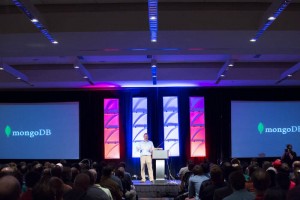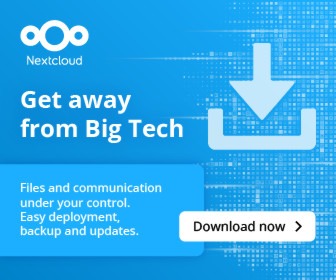Editor’s note: This is the second of a three part series focusing on an interview with Dwight Merriman, co-founder of MongoDB. Part one was published Monday as From DoubleClick to Database.
“I think everyone’s using open source,” Dwight Merriman, MongoDB’s Chairman and Co-founder, said. “That’s the preference. That’s what they want to use. All else being equal, there’s no way they’re going to use a closed source product. I mean, if there’s nothing else available they’ll buy it.”
We were sitting with our backs to a wall in a large nook area tucked out of the way, just off from the main hallway for the All Things Open conference at the Raleigh Convention Center. Lined up along each side of the hallway were a series of eight by eight foot vendor booths, where developers and distributors were talking up their open source products and services to anybody who would listen. The small crowd that was milling about was making enough noise to worry me a little that my small hand held recorder wouldn’t pick up the interview clearly. Merriman is a relatively soft spoken guy — at least he was on that day.

Click to enlarge
“I think they’ll use SaaS,” he went on. “People like SaaS a lot. Well, what is that? I guess it’s technically closed source, but it’s in the sky. They don’t really think of it in the open or closed source way. A lot of developers I know don’t want to use anything that isn’t open source. Then I’ll ask them what about SaaS and they’re like, ‘Oh yeah, I love SaaS.’ That’s not open source, usually, or let’s say often. In their mind it’s just a completely different bucket.”
Merriman was tired. His flight from Ohio had been delayed by a few hours, causing his arrival to be later than expected. An hour or so earlier, a little after nine o’clock, he’d given a keynote address, following Raleigh’s mayor, Nancy McFarlane, and Forrester’s Jeffrey Hammond to the podium. After that, he’d spent 45 minutes in a meet-the-speaker session, which I assume meant a lot of handshaking, nodding and exchanging of business cards.
“I think we also see some freemium these days,” he added.
At this point, we were about ten minutes into the interview and I’d asked him why the decision was made to release MongoDB under a copyleft license.
“If I were starting something new today that was software as a business, I would make it either open source or SaaS or freemium,” he said. “I would definitely not make it closed source if I’m starting from day one, ’cause I don’t think it works anymore. I think you’re going to have competition. There’s going to be stuff out there. It’s going to be tough. If you’re starting today, it’s sort of what are people doing five years from now would be the question.”
I took that to mean that as important as open source is now in the business world, it’ll only be more important in the future.
“It felt very clear to us that it needed to be open source, what we were doing,” Merriman continued. “We also like open source, so that was a factor too, almost a non business reason. A business reason, though, is part of the idea of strategy. We really wanted to be ubiquitous; we wanted to be everywhere. If people are using this database they need to know it and they need to understand it. There needs to be a community. There needs to be a critical mass of knowledgeable people, workers, who can code to it, who can administer it, who can operate it. It’ll be much easier to do that if it’s open source because it’ll be much wider used.”
I wondered if having a quality project that’s freely available makes it easier to get that done.
“Yes, he said. “It definitely makes getting started, go to market, easier. And then there’s also the question: if it’s closed source, how do you compete with these big companies? I mean, how do you compete with Oracle?”
“Development cost is lower as an open source project too, I would imagine?” I asked.
“For us?”
“Yeah. I’m thinking that you can use other open source code…”
He nodded. “Yes. And contributions. You know, one of the challenges, like with a database, is that the code is pretty big and complicated, right? So, if I’m just out in the community and I want to contribute, it’s a little hard because I have to know the code perfectly before I can do it. What we do see though is a lot of activity and people doing things, but because of what I just said, we see a lot more activity where people are working on drivers or frameworks or tools or administration or other things which all kind of surround the product, and that’s great. The volume of work that’s been done around those by the community is high. Sometimes they might want to contribute to a product that we manage, like a fork we manage, like a driver, or it might be something they made and we had absolutely nothing to do with it.”
“But you can use it?” I asked.
“Yes. Or anyone can use it,” he replied. “It might be an application development framework for Java developers that runs on the MongoDB Java driver and then you talk to the MongoDB database. If you’re using that framework, the database user uses it and we’re sort of uninvolved and actually have no say in the matter and the usage of it.”
When I mentioned, Barbara Walters style, that it must be a good feeling to know that people who aren’t directly connected with the project or organization are writing code for it, Merriman shrugs it off with a simple, “Yeah,” as if to say that goes without saying.
“There are also people who’ve started companies that are in the MongoDB space,” he said. “I think a couple of examples are Mongo HD and MongoLab — one of them might have changed their name or something — but they’re hosting MongoDB in the cloud. Those are companies, independent from us, although partners. Rackspace has a hosting MongoDB service called ObjectRocket, so that’s inside Rackspace but its a product in their business.”
Proprietary heavyweights such as Microsoft or Oracle would have conniption fits at the thought of their IP being leveraged by others for profit, without a piece of that profit being returned to their coffers. Merriman sees it differently. To him, the open source way is good for business. “We might be a partner,” he explained, “but in general our philosophy is we think there should be a big ecosystem. It could be people doing consulting so there are experts for training out there or it could be other businesses. The bigger that is, the better because it’s self reinforcing.”

“No, I was just saying the three buckets I see out there right now are SaaS, freemium and open source.”
“So if I licensed MongoDB under a proprietary license, I’m not going to get anything I wouldn’t get, other than service perhaps…”
“We’re doing a couple of things,” he interjected. “We are doing an open core model where we have an enterprise edition that is non-free. However, today it’s very thin or light. In other words, we really had a high bias towards doing things in the free version. So the enterprise version has a lot of advanced security features, for example. We’re really trying to find those features that highly correlate with big enterprise usage and then saying if you want kerberos support, that’s in the enterprise edition, that is not free. So we do have some non-free things as a company. However, they’re not so much freemium, where it’s free to this usage level and then not, because that’s not open source of course. Well, it depends on whose definition you’re using, but in general people think of it that way.”
Indeed, companies that are aggressively open core, which is how freemium usually plays out in open source, are seen by most open source proponents as being proprietary vendors masquerading as open source because users must purchase proprietary add-ons in order to effectively use the software. Mongo’s “enterprise edition” model would seem to be different, because the added services aren’t essential to the use of the database.
“We’re also doing some management tools that are sort of SaaS style,” Merriman continued. “We charge for them, including like a backup to the cloud service, information tools and so forth. Actually, we do have a tiny free tier on those, but I don’t think of those as freemium, I just think of them as SaaS and not open source. They’re like tooling; they’re management tools around it, which is a pretty traditional commercial open source model, where you’ve got a free product and stuff around it is not.”
For clarification, I asked, “If I’m a web developer and I want to use MongoDB, I’m pretty much going to have everything that I need?’
“You can definitely use it for free and you pretty much have everything you need,” he agreed. “Actually, most people use it that way today. Now, I will say, if you use our automation tools, which are not free, it’s going to save you a lot of time and make your life a heck of a lot easier, especially if you have larger clusters to administer. We just made a big release of this MMS automation thing, so if you had a hundred server MongoDB cluster, you can provision it with a click; you can upgrade it with a click. These are things that, just because there’s a hundred machines, would be a lot of work.”
On Monday, I’ll conclude my interview with Dwight Merriman. Among other things, I’ll share what he had to say about FOSS in consumer space.
Read the first part of our interview with Dwight Merriman, From DoubleClick to Database, and part three, Vendor Lock, Forks & Desktop FOSS.
Christine Hall has been a journalist since 1971. In 2001, she began writing a weekly consumer computer column and started covering Linux and FOSS in 2002 after making the switch to GNU/Linux. Follow her on Twitter: @BrideOfLinux









